#wars microexpressions are a gift to this world
Explore tagged Tumblr posts
Text
guys do you think... he moved only out of instinct but... he still presented his face. to take the hit.
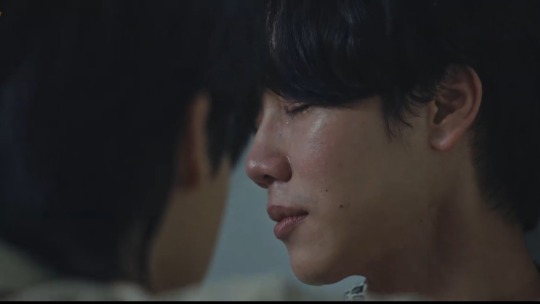
because look at that slightly scrunched face... he was already hurt from the impact of the loss he was in the process of going through but he was tired, he just wanted to be hit.

and when jack didn't do that, he started doing it to himself.

(and on a different note... while joke had people to stop hurting himself, jack, the chronic isolator— who just isolated himself from the only person who would dare to stop and question him— gets beaten unconscious and probably wouldn't have made it back without hopesave bringing him home)

#i will BURN the world#the harm to the self I commit everytime I rewatch this fucking epsiode#i cried so hard... the whole epsiode is like being tortured but the first part is so specifically excruciating#and yinwar are such good actors it blows my mind#wars microexpressions are a gift to this world#jack and joker u steal my heart#jack and joker
59 notes
·
View notes
Text
Now, About That Sceptre
Based on hair growth, if nothing else, it seems that a fair amount of time must have passed between Loki's appearance in the post-credits of Thor (2011) and his dramatic entrance via the Tesseract in Avengers Assemble. Despite the apparent time jump, Loki's physical well-being is still clearly... not great. His appearance has improved in some ways from the horror show above (the burns have healed, his mouth isn't full of blood), but he shows a number of signs of heat exhaustion, at a minimum (something especially relevant because, remember, Loki's a Frost Giant). He's visibly exhausted and disoriented, he nearly collapses on multiple occasions, he's sweaty and pale with dark and sunken eyes. This is not a healthy man. And while there was maybe an argument to be made for his prior physical distress being contributable to the effects of the wormhole, whatever's happening here is all Thanos.

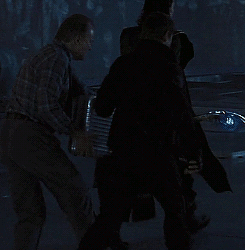
Beyond his immediate physical state, he comes across as paranoid, afraid—desperately fighting to get through just this one moment, and then the next, and then the next. If he just holds it together a little bit longer, he'll be safe. He'll be able to rest. Watch how he stumbles. Observe his deathgrip on the sceptre and on the truck rail. Look at his desperate facial expression and body language. He's trembling.
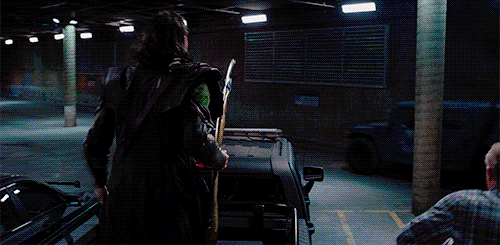

Now we're getting into psychology, and well... Loki says some odd things throughout this film. The Loki of Thor (2011) was clearly dealing with a mental health crisis, but the Loki of Avengers Assemble seems—not to put too fine a point on it—crazy. And he's not just crazy. His words and his body seem to, at times, be in direct conflict with one another. He may talk down to the humans, but he appears to take little pleasure in actually hurting them. And yet he summons an army of aliens with the expressed purpose of doing just that. He's sassy and grandstanding while facing the Avengers, but on the occasions where he's violent with civilians, as well as whenever he's alone, he appears to dissociate from himself. Look at his face. This is not remotely fun for him. He looks dead inside.


Overall, Loki's body language and facial expressions often betray a Loki who is struggling to justify his actions. He seems, at times, almost as though he is speaking to himself as much as he is taunting the Avengers or humanity. Here are some quotes/scenes that grab my attention.
For a start, there are these exchanges with Fury shortly after he first arrives via the power of the Tesseract:
Fury: "This doesn't have to get any messier." Loki: "Of course it does. I've come too far for anything else."
"I am Loki of Asgard, and I am burdened with glorious purpose."
Loki: "I come with glad tidings of a world made free." Fury: "Free from what?" Loki: "Freedom. Freedom is life's great lie. Once you accept that, in your heart, you will know peace."
He goes on to reiterate his bizarre speech about "freedom" again in Stuttgart.
"The bright lure of freedom diminishes your life's joy in a mad scramble for power, for identity. You were made to be ruled. In the end, you will always kneel."
This all sounds a lot like indoctrination to me, and it's worth noting that the Black Order—for whom Loki is ‘working’ in this movie—is literally a cult. In fact, they use very similar rhetoric at the beginning of Avengers: Infinity War. Compare this to Loki's rhetoric on the nature of freedom:
"Hear me... and rejoice. You have had the privilege of being saved by the Great Titan. You may think this is suffering. No. It is salvation. Universal scales tipped toward balance because of your sacrifice. Smile, for even in death you have become Children of Thanos."
And then there's Loki's outburst directed at Natasha after the Avengers have taken him prisoner for the first time and she's trying to get information out of him:
"You lie and kill in the service of liars and killers. You pretend to be separate, to have your own code, something that makes up for the horrors. But they are a part of you and they will never go away!"
Before this moment, he seems relatively calm and in control. Something changes here; he becomes disgusted and aggressive. His words could easily be applied to himself as well. Here Loki is on Midgard, pretending to have his own agenda. "Something that makes up for the horrors". Yet as much as Loki claims to be free of sentimentality, we as the audience know better. We can see it in his microexpressions and his body language. We know of his being psychically linked to The Other. We see the nature of Loki's interactions with them: the tears in his eyes, the threats and his attempts to suppress and hide his fear, the pain they're able to inflict on him with just a touch.
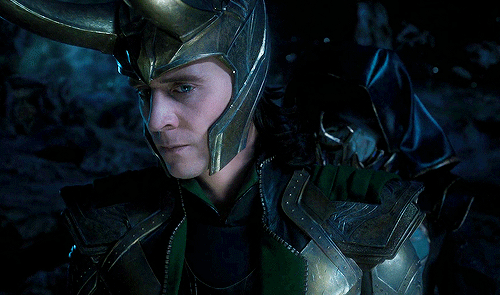

"If you fail, if the Tesseract is kept from us, there will be no realm, no barren moon, no crevice where he cannot find you. You think you know pain? He will make you long for something as sweet as pain."
There are also subtle indicators that Loki's memories might have been tampered with, such as his initial conversation with Thor.
"Our father—" "YOUR father. He did tell you of my true parentage, did he not?" "We were raised together! We played together, we fought together. Do you remember none of that?" "I remember a shadow. Living in the shade of your greatness. I remember you tossing me into an abyss."
Yes, of course, it's possible that this is hyperbole on Loki's part. Regardless, it's worth noting as part of a pattern of bizarre, cult-like behaviours that Loki displays throughout the movie. It becomes even more noteworthy in light of the revelation that Loki was being influenced by the mind stone all the while. The specific phrasing Marvel uses is, "fueling his hatred over his brother." Does that include distorting his perception of what's happened between them? It's not conclusive, but it's certainly possible.
Now, Loki does at times appear to be genuinely enjoying himself. I'm not denying that or sweeping it under the rug. But look at the context. Notice when he seems to be the most amused. It's when he's grandstanding. It's when he's the center of attention. When people run screaming from him. When he's being interrogated. It's not the violence that pleases him; it's the recognition. For the first time in his life, he's center stage. He feels powerful. And Loki will always take negative attention over no attention at all.

Simmer down there, you lovable maniac.
At the other end of the spectrum, however, we have moments like just before he stabs Thor, in which he looks at the destruction around him with legitimate panic and horror written on his face. As though he's awoken from a haze and is only just realising the extent of what he's done. (Side note: for the life of me, I'll never understand people who call Loki a psychopath. Every single time we've seen Loki hurt Thor, he does it literally with tears in his eyes. And yet Ragnarok would have us believe he's done so all throughout their childhood just for funsies).
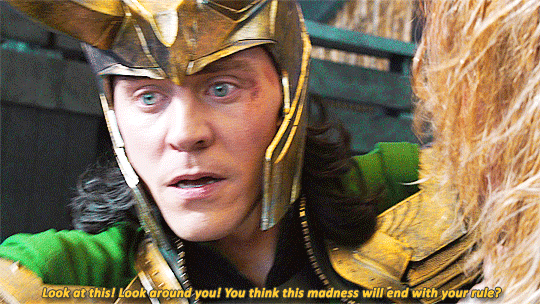
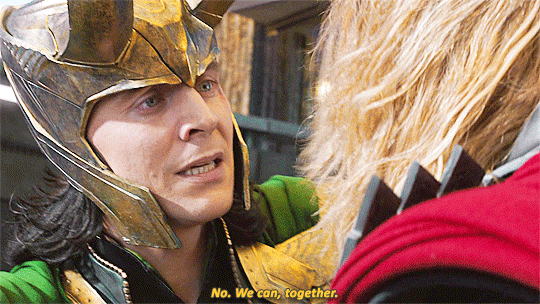
Surely this isn't the expression of a man who wants all this death and destruction—who's carrying out his own will. And why should he? Even if he truly meant to/cared about ruling Midgard, there's little reward in ruling a world of corpses.
Which brings us to our ultimate conclusion. As mentioned above, there have long been theories—now confirmed canon—that Loki was under the influence of the sceptre AKA the mind stone throughout Avengers Assemble. An observation I had missed initially is that some fans desperate to cling to Loki's identity as a Villain™ have differentiated between the total mind control of Barton and Selvig and the 'influencing' of Loki's behaviour via the sceptre. But note that the same language is used for both instances:
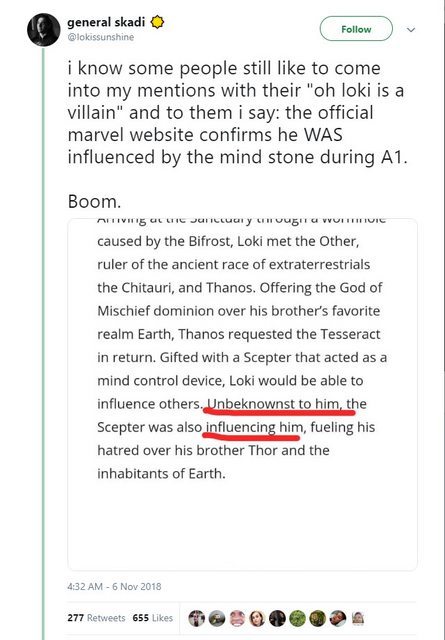
"Gifted with a sceptre that acted as a mind control device, Loki would be able to influence others. Unbeknownst to him, the sceptre was also influencing him."
I do believe that the mind control over Loki was less effective; he clearly maintained some measure of autonomy, despite the sceptre's influence. But I still think it's important to note the consistency of language used. And in fact, it’s worth noting that his control over Barton and Selvig wasn’t absolute either. Barton admits he may have failed to kill Fury because of his connection to him; Selvig installs a failsafe for shutting down the portal.
We also know—thanks to yet another stupidly discarded deleted scene—that The Other can hear and communicate with Loki at all times. Look at the longing on Loki's face when Thor tries to reason with him. He wishes so badly that he could accept Thor's offer. But this is still a hostage situation. He's on permanent speakerphone, and he knows there's no safe escape route for him.
↩️ back to the compendium
#the big damn ragnarok sucks compendium#avengers assemble#loki meta#loki#topic: the chitauri sceptre/mind stone#thanos#the black order#mcu#topic: loki was tortured
2K notes
·
View notes
Text
7 Things People Don’t Realize You’re Doing Because You’re The Child Of A Narcissistic Parent
New Post has been published on http://foursprout.com/happiness/7-things-people-dont-realize-youre-doing-because-youre-the-child-of-a-narcissistic-parent/
7 Things People Don’t Realize You’re Doing Because You’re The Child Of A Narcissistic Parent
God & Man
Being the child of a narcissistic parent is one of the most heartbreaking and traumatizing things a person can go through. Not only are you required to survive a war zone in childhood, you are left with life-long consequences that extend far into adulthood. Here are seven things you might be doing as a result:
1. Apologizing more than you have to, even if no apology is needed.
Children of narcissistic parents tend to become fluent in saying “sorry” – even for just their very existence. It’s because they’ve been taught by their parents that they are a burden. This is especially true for female victims who are also socialized to be people-pleasing and accommodating. It takes time to unlearn this behavior and learn to only apologize for actual transgressions rather than any perceived burdensomeness.
When evaluating whether to apologize, ask yourself: Was I the cause of this in any way? If not, replace your “sorry” with “That’s unfortunate” instead. You could be “sorry” that the circumstances are what they are, but if you are not personally responsible, you have no reason to apologize. And if the event in question was the fault of someone else, let them carry the burden – lift the weight off your shoulders completely.
Remember that there are many people in this world who don’t even have the courtesy to apologize to you for their wrongdoings – so the last thing you want to do is overextend yourself by apologizing for things you didn’t even do wrong.
2. Hesitating to say no, because it might displease others.
As a child, you were conditioned to obey your toxic parents even at the expense of your own welfare and basic needs. You were punished and abused when you did refuse to comply to their demands. Saying “yes” was a vital part of your survival as a helpless child who did all he or she could to ensure that their parent did not abandon them.
Now, as an adult, saying no is a part of having healthy boundaries. However, it can feel absolutely intimidating at first. The key is to check in with yourself about why you’re fearful of saying no, preparing for any potential consequences, and allowing yourself to feel the discomfort – yet still sticking to what you know to be true.
Ask yourself on a daily basis, “Am I doing this to please someone else, or because I really want to do this?” It’s okay to evaluate whether someone has invested in you in the way they want you to reciprocate and go from there. If you’re the only one giving while they’re taking, it’s an unequal relationship and there’s bound to be a power imbalance. There are some things you may not be able to avoid doing, but this is still a healthy start to reconnecting to your authentic desires.
3. Doubting your own perceptions and second-guessing your intuition.
Although we’re highly sensitive and intuitive, we’ve also been gaslighted most of our lives by abusers into thinking otherwise. We tend to underestimate our own emotions and instincts while overvaluing the comfort of others. This can lead us into some very dangerous situations like abusive friendships, relationships, work environments, or shady business deals.
There are some simple questions you can start asking yourself if you want to understand whether the problem is you or them. Does everyone make you feel this uncomfortable, or is it mainly this person who sets off the inner “smoke alarm”? Have you noticed similar toxic behaviors in this person as you’ve experienced with your parents? Would you ever treat anyone the way this person is treating you? And if not, would you feel uncomfortable witnessing them treating someone else in a similar manner?
These questions can help you to reconnect with your basic rights, to see the situation from multiple perspectives. For example, often as children of narcissists we tend to prioritize the suffering of others over our own, so the last question helps to distance ourselves and recognize when mistreatment is occurring because we see how awful the situation would feel to someone else other than just ourselves. It makes us realize that it’s okay to verify when someone is being a straight up asshole – and that it has nothing to do with you and everything to do with them as a human being.
4. Checking in constantly about how someone else feels about you without tending to how you really feel about the person.
Since you were raised in a chaotic, unstable environment, it makes sense that you’re fearful of situations where you’re likely to encounter the possibility of change. As a result, you’re always on the lookout as to whether something has shifted or changed. You’re always questioning the status of your most intimate relationships. You don’t have a firm grasp on how others feel about you, so, as a result, you try to take back control by micromanaging your relationships.
The healthier route would be to step back and reevaluate whether the people in your life you’re so desperately attempting to cling onto even deserve a seat at your table. Do they deserve your energy and efforts? Sometimes, we’re so consumed with how others perceive us that we forget to honor how we feel about them.
We forget to give ourselves permission to dislike someone, to address conflict, to confront, or even just to acknowledge when someone has reached epic levels of douchebaggery. A fun way to counter this people-pleasing behavior is to create a mantra for yourself: “Are they a douche?” If so, so be it! Acknowledge the reality rather than bending over backwards trying to rework your perception of toxic people into something more socially acceptable. Some people really are just horrible people, and that’s okay – that doesn’t mean you have to tolerate them.
And even if they are trustworthy friends or partners, they are not the arbiter of our self-worth or your right to be loved. It can be terrifying to consider for someone raised to be dependent on the validation of others, but we can and will survive with or without them or their approval. Some people rightfully need to be cut out of our lives, while others will provide a source of safety and support. They key is discerning the difference.
5. Picking up on micro-signals of abandonment or displeasure.
Children of narcissists become hyper-aware and attuned to microexpressions, gestures, changes in tone of voice that signal abandonment or displeasure. They had to become aware of these to survive and navigate sudden changes in their environment. They needed to know when their parent’s next rage attack was about to begin or what they could “do” to avoid being punished.
As an adult, you’re highly intuitive about the motives of others as well as their true emotions. You catch onto subtle shifts with incredible ease. This gift of intuition can be used wisely to navigate social interactions, but it can also be overwhelming. Sometimes, this hyperfocus detracts from owning your agency in detaching from the person and instead causes you to become obsessed with pleasing them. Rather than focusing too much on these, try taking note of such changes without becoming enmeshed in the other person’s feelings.
6. Taking your time to trust.
As a child you were violated, emotionally or even physically abused. Your trust was taken advantage of, time and time again. It is no wonder you have a hard time letting people in. That doesn’t make you wrong – this is simply a testament to the trauma of your experience.
In many cases, slowing down and taking the time to trust is a good thing – it means you are aware that there are emotional predators who could take advantage of your kindness. You might take months to disclose personal information (or seconds, if you have more porous boundaries where you’re oversharing). You might feel hypervigilant when you notice red flags. It’s okay to know that trust has to be earned.
There are trustworthy people out there, you just have to be willing to see people for who they truly are, not who you want them to be or who they pretend to be.
7. Having a problematic relationship with uncomfortable emotions like pain and rage: either repressing them completely or allowing them to consume you.
Children of narcissists are chronically emotionally invalidated from a very early age. They are conditioned to believe that their emotions don’t matter or that their emotions make them defective. They learn to suppress their anger and stifle their hurt. Owning their “dark side” (or what they perceive to be dark) can be frightening.
As a result, they may bury their true emotions for a lifetime, eventually “snap” or become easily overwhelmed with bottled up emotions because they never learned how to healthily process, channel and heal these emotions from the onset. Children of narcissists can be straight up scary when their real emotions are finally allowed to come to the surface – I say this in half-jest, knowing how overwhelming it can be when you were raised to feel like having emotions were pathological. Developing a healthier relationship to your emotions – and a better outlet for them (such as writing, meditating, counseling, exercising) can be life-changing.
Learning to identify and validate all of your emotions – without necessarily acting maladaptively on them – can be vital to exercising your basic human rights and implementing your boundaries. It’s important to learn how to constructively stand up for yourself – and it is especially important as the child of a narcissist, when nobody stood up for you.
Don’t give up hope. Despite their struggles as adults, children of narcissists have tremendous resilience and all the more reason to pave a brighter future for themselves and future generations.
0 notes